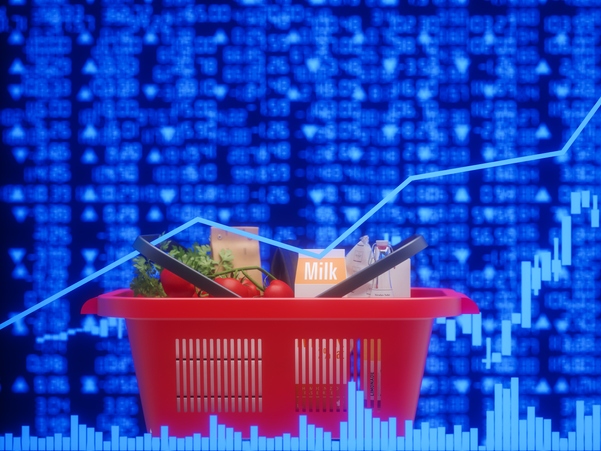IRI has flagged the need for the FMCG sector to move quickly in response to escalating inflation and rapidly changing consumer behaviour in order to navigate through the next 12 months and drive growth.
New Zealand is experiencing its highest inflation pressure for thirty years with the latest data revealing the annual rate at 6.9%. IRI has responded by delivering a webinar on inflation for their retailers and manufacturing clients to explore the impact of inflation on the sector and provide support and strategies for growth.

Craig Irwin, Managing Director for New Zealand and Hong Kong, with IRI®, the global leading provider of data, analytics and technology to FMCG Retail, has announced the launch of IRI’s Inflation Impact Tracker which is designed to provide the FMCG sector with timely in-depth insights into the impact of inflation on the FMCG sector and consumers.
Irwin says: “New Zealand’s FMCG sector is the country’s leading barometer of, and a major player in, the economy. As the front-line sector for the economy, we are facing one of the biggest challenges thanks to a maelstrom of global and local events which are pushing up inflation and creating other market pressures.
“In the first quarter of this year, New Zealand’s consumer price index (CPI) rose at its fastest pace in over 30 years taking the annual inflation rate to 6.9%. Increased inflation impacts consumers and their shopping behaviours and as New Zealand’s leading voice on the sector, IRI is moving swiftly to work with and support New Zealand’s FMCG suppliers during this challenging time.
“Our Inflation Impact Tracker provides excellent insight into the state of the industry as well as the sentiment of consumers. The Inflation Impact Tracker reports are comprehensive and are built based on three extensive bodies of data, information and insights including: scan data, the IRI Cost of Living survey; and our first-in-market IRI Cost Benchmarking Survey.
“Our research clearly shows that consumers have already started to change their shopping behaviour and this is likely to accelerate as New Zealand’s economic situation becomes more challenging.
“We are now facing a value-driven consumer who is more price sensitive and focused on purchasing smaller pack sizes or value through volume. However, there is a large bifurcation of consumers and how each group behaves during this challenging time will differ substantially and continue to evolve.
“Accordingly, suppliers and retailers need to respond quickly to the new consumer mindset and understand how this bifurcation will play out in their categories.
“Consumers are undertaking a number of strategies to manage their weekly grocery budget. This includes buying larger pack sizes, shopping at multiple locations to get the best price and in some cases, going without if the product they want is not in stock or becomes too expensive.
“During the pandemic, shoppers tended to trade up if the product they wanted was not in stock, reinforcing the existing trend towards premiumisation. We are now seeing that trend dissipate as budgets tighten. With the bifurcation of shoppers, we anticipate in some instances premium products will continue to do well, but we are also seeing a shift in consumers trading into more affordable options like private label.
“Consumers are now spending more time planning when it comes to shopping and they are looking for ways to make food last longer. Shoppers are opting for frozen food over fresh and 40% of shoppers are cutting out meat products to save money.”
According to Irwin, businesses across the FMCG sector will need to focus on key areas.
1. Smart and efficient promotions
Promotion spending will reduce across the sector and need to be more finely managed and tightly aligned with verifiable return on investment.
2. Recalibrated pack sizing
Honest shrinkflation will assist shoppers to meet their budgets and garner consumer support. Meanwhile larger pack sizes will assist to drive value through volume.
3. Support and education
Consumers value guidance on how to save money. FMCG businesses that support this process through education and tips are more likely to win sales.
Irwin says: “The next 12 months will be challenging for businesses as labour shortages, worker absenteeism, supply and transport issues and continued increases in input costs persist, however 83% of suppliers surveyed are optimistic they can weather the storm ahead. Many are positive and focused on the long term and committed to driving growth through established fundamentals such as sustainable and healthier products.
“The Inflation Impact Tracker will certainly become an important tool for many across industry and we look forward to sharing our data and insights to assist and support the industry wherever possible as we work through this complex time. In addition, IRI also offers a range of other analytic products that are also ideal for suppliers and retailers seeking to address inflationary pressures through pricing and promotions, marketing analytics and product assortment.
“The only way to thrive through this is to stay informed, understand your categories and consumers deeply, and have a range of plans to enact depending on how things emerge. IRI can help with all of this. We are here and we are all in this together.”
About IRI
As a forward-thinking FMCG business, you’re driven by a constant desire to innovate and anticipate your customers’ next move.
However, spotting the right opportunities can sometimes be challenging. At IRI, we make the complex simple. Powered by our integrated and market-leading technology, analytics, and Liquid Data™ we work with you to deliver insight and consulting solutions that help you stay ahead of the curve and deliver on your customers’ changing needs. We help you see what’s possible, so you can pursue your potential.
Find your advantage IRIworldwide.com



